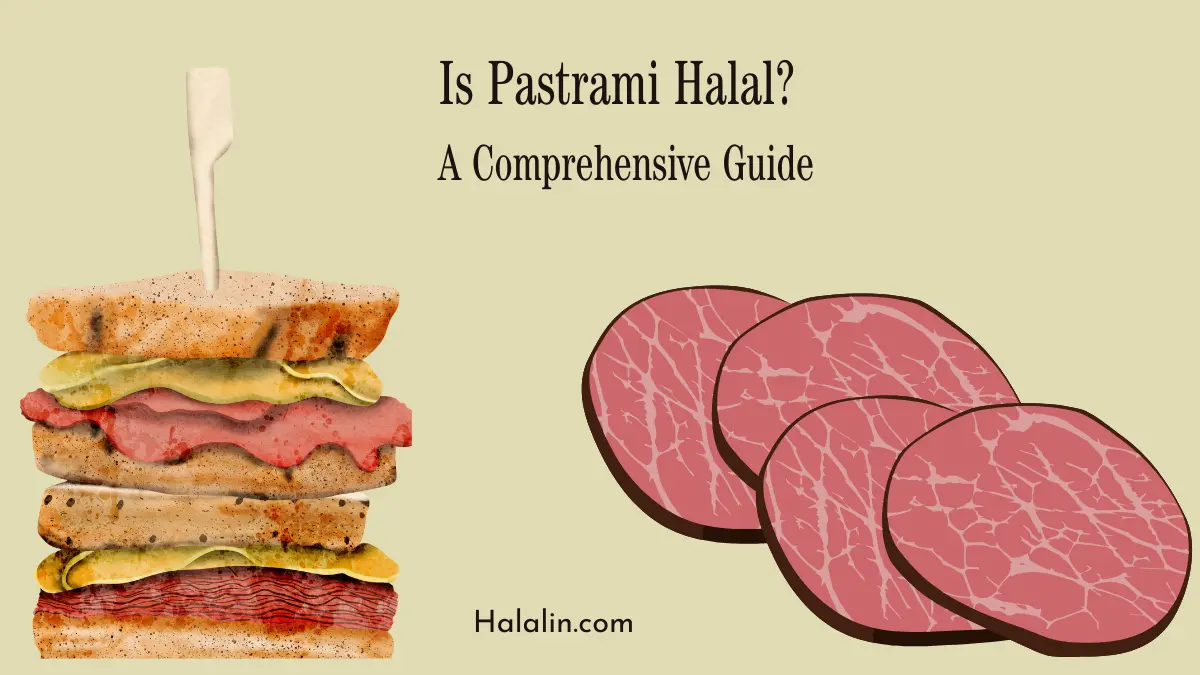Pastrami, a beloved delicacy in many cultures, often raises questions about its Islamic status among Muslim consumers. This blog post delves into the origins, preparation methods, and considerations necessary to determine whether pastrami is halal. By the end, you’ll have a clear understanding of what makes pastrami halal or not, and how to ensure you’re making the right choice according to Islamic dietary laws.
What is Pastrami?
Pastrami is a type of cured meat typically made from beef. It involves a specific process of brining, seasoning, smoking, and steaming. Originally from Romania, pastrami gained popularity in the United States, particularly among Jewish communities, where it became a staple in deli sandwiches.
The Halal Criteria
For any food to be considered halal, it must adhere to Islamic dietary laws, which include:
- The source of the meat must be from an animal that is permissible to eat in Islam (e.g., cows, sheep, goats).
- The animal must be slaughtered in the name of Allah.
- The method of slaughter must ensure the animal’s blood is fully drained.
- No cross-contamination with non-halal substances.
Ingredients in Pastrami
Traditional pastrami recipes include:
- Beef (usually from the navel end of the brisket)
- Brine (water, salt, sugar, and sometimes nitrates or nitrites)
- Spices (peppercorns, coriander seeds, garlic, mustard seeds, etc.)
- Smoking agents (often wood chips)
Is Pastrami Halal?
Yes, The primary consideration is whether the beef used in pastrami is halal. This depends on how the cattle were raised, fed, and slaughtered. Halal beef must come from animals slaughtered according to Islamic rites, which include invoking the name of Allah at the time of slaughter and ensuring the blood is fully drained from the veins.
Evidence
- The Quran, Surah Al-Ma’idah (5:3), states, “Forbidden to you (for food) are: dead meat, blood, the flesh of swine, and that on which hath been invoked the name other than that of Allah.”
- Hadith from Sahih Muslim (21:4752) reinforces the requirement for the invocation of Allah’s name during slaughter.
The Brining Process
Brining involves soaking the meat in a solution of water, salt, sugar, and various spices. While these ingredients are typically halal, it’s important to ensure that no alcohol or non-halal additives are used in the brining process. Some commercial brines may contain additives that need to be checked for halal certification.
Seasoning and Smoking
The spices used for seasoning pastrami are generally halal. However, the smoking process can introduce complications. Some smoking agents or flavorings might contain alcohol or other non-halal ingredients. It’s crucial to verify that the smoking process does not involve any non-halal substances.
Cross-Contamination Concerns
Cross-contamination with non-halal foods can occur during processing, packaging, or serving. For pastrami to be considered halal, it must be prepared and handled in a manner that avoids any contact with pork products, alcohol, or other non-halal foods.
Halal Certification
The easiest way to ensure pastrami is halal is by checking for halal certification. Certification agencies inspect the entire process, from the source of the meat to the final product, ensuring all steps comply with Islamic dietary laws. Look for recognized halal certification symbols on the packaging.
DIY Halal Pastrami
For those who prefer a guaranteed halal option, making pastrami at home is a viable solution. By sourcing halal-certified beef and controlling every step of the preparation process, you can enjoy pastrami without any doubt about its Islamic status. Here’s a simple outline of how to make halal pastrami at home:
- Source Halal Beef: Purchase beef from a trusted halal butcher.
- Prepare Brine: Mix water, salt, sugar, and halal-certified spices.
- Brine the Meat: Soak the beef in the brine for several days.
- Season: Coat the meat with a mixture of ground peppercorns, coriander seeds, and other halal spices.
- Smoke: Use a smoker with halal-certified wood chips.
- Steam: Cook the meat until tender.
Popular Halal Pastrami Brands
Several brands offer halal-certified pastrami. These brands have undergone rigorous certification processes to ensure their products meet halal standards. Some well-known halal pastrami brands include:
- Midamar: Known for its wide range of halal deli meats.
- Crescent Foods: Offers halal pastrami that is widely available in various regions.
- Zabiha Halal: A trusted brand for halal meat products.
FAQs
Q1: Can pastrami be halal if it’s made from turkey or other meats?
A1: Yes, pastrami made from turkey or other permissible meats can be allowed as long as the meat is slaughtered according to Islamic rites and all other ingredients and processes are halal-compliant.
Q2: How can I be sure that the pastrami served in restaurants is allowed?
A2: Look for halal certification from reputable organizations and ask the restaurant staff about their sourcing and preparation methods.
Q3: Are there any specific spices or ingredients in pastrami that might not be allowed?
A3: While most spices are halal, it’s important to ensure that no alcohol or non-halal additives are used in the brining or seasoning process.
Q4: Can I trust online sources for halal pastrami?
A4: Always verify the halal certification and reputation of online sources before purchasing. Look for reviews and certifications from recognized halal authorities.
Q5: What should I do if I’m unsure about the Islamic status of pastrami?
A5: When in doubt, opt for certified halal products or make pastrami at home using halal-certified ingredients.
Conclusion
Determining whether pastrami is halal involves understanding the source of the meat, the ingredients used, and the preparation methods. While traditional pastrami can be allowed, it’s essential to verify the Islamic status of each component and the overall preparation process. Halal certification provides a reliable way to ensure compliance with Islamic dietary laws.
Alternatively, making pastrami at home with halal ingredients offers a surefire way to enjoy this delicious meat without any concerns. By following the guidelines in this blog, you can confidently enjoy allowed pastrami, knowing it meets the necessary religious requirements.

